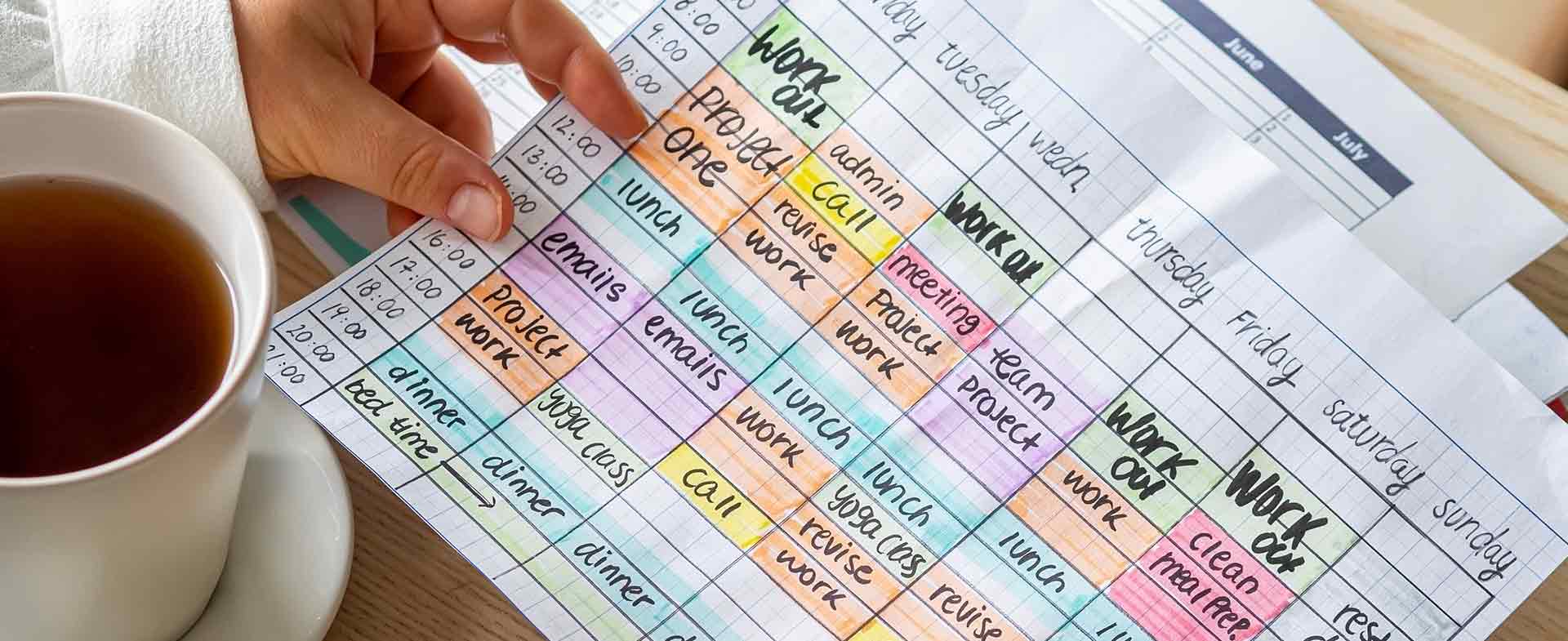Ever look at the week ahead with a sense of overwhelm and dread? Knowing how much you have to accomplish during the week can be paralyzing, particularly if you don't have a plan in place.
"When you're under stress, the fight-flight-or-freeze response kicks in and logical reasoning takes a backseat," says Jay Weiss, MA, LLP, an employee assistance program therapist at Henry Ford Health. The good news: You can regain control when you learn how to portion your to-dos into bite-sized chunks.
Time Blocking Explained
In today's digitally dialed-in world, it can be difficult to stay on task. In fact, if you spend your day putting out the fires that come through your phone, you may discover that you can't get anything done.
That's where time blocking comes in handy. "Time blocking allows you to toggle between tasks so you're more likely to stay focused," says Weiss. So instead of setting aside five to six hours to focus on the same project, you portion off your time into smaller chunks so you can really focus.
"After that block of time — usually one hour or less — you can get up, move around and switch to another task," Weiss says. That way, you're able to return to the original project with fresh eyes and renewed focus.
Time-Blocking Tips
Whether you struggle with focus and attention, or simply have too much on your plate, blocking time during the day to get specific tasks done can help ensure you tick more items off your to-do list.
Unfortunately, time blocking isn't an exact science. Some people try to crank out easier tasks first, so they feel a sense of accomplishment. Others do best when they tackle more challenging tasks first.
According to Weiss, it doesn't matter which way you roll as long as you block your time in a way that's reasonable. The five basic ground rules:
- Be realistic. When you begin time blocking, start small. Even 10 to 15 minutes of focused attention can be enough to move the needle on a big project. "Getting 20% of your job done is better than nothing," Weiss says. While leaving projects unfinished can be uncomfortable at first, most people discover that the quality of their work is better if they don't try to bite off more than they can chew.
- Experiment. It's okay to play around with time blocking until you discover the formula that works best for your needs. Maybe you can stay on task for 30 minutes. Or you might need to block your time in 15-minute chunks. The key is to notice when your mind naturally starts to shift gears and make sure you block your time before that happens.
- Create clear boundaries. Time blocking often works best when you establish physical parameters around your time. "When people work from home, there's a blurring of the lines between work and leisure or play," Weiss says. So, when you're in the office, you're working — even if the dog or the kids want to play. When you're in the family room, you're relaxing, not working.
- Limit distractions. It's almost impossible to silence all distractions, but you can set the stage to minimize disruptions. Before you sit down to work, silence your cell phone, close your office door, and tell your coworkers and family members that you will be unreachable for that time block. "The goal is to create an environment with as few distractions as possible," Weiss says.
- Take breaks. Time blocking is only effective when you build in breaks. In fact, according to Weiss, taking a 10 to 15-minute break can help enhance your focus. His advice: Go low-tech with time tracking. Instead of using your computer or cell phone, try an old-fashioned egg timer or even a stopwatch, then turn it face down to avoid looking at it until time’s up.
Time Blocking Versus Multitasking
It's important to note that time blocking is not the same as multitasking. In fact, they produce strikingly different results. Time blocking encourages you to be more productive, while multitasking actually reduces efficiency.
"With multitasking, projects not only take longer to complete because you're dividing your attention amongst multiple projects, but you're also more likely to make mistakes," Weiss says. "Time blocking, on the other hand, allows you to do better work at a reasonable pace, and that means greater success."
According to Weiss, you can even use time blocking to tackle personal or home projects, such as meditation, exercise or even washing the car. Still having trouble staying on task and getting your work done? Talk to your healthcare provider. It's possible something else is at play.
To find a doctor or mental health professional at Henry Ford, visit henryford.com or call 1-800-436-7936.
Jay Weiss, MA, LLP, is a certified health and wellness coach and an employee assistance program therapist at Henry Ford Health.



